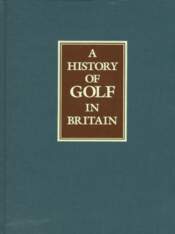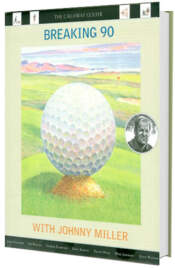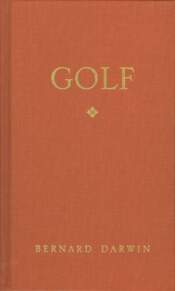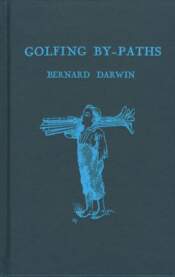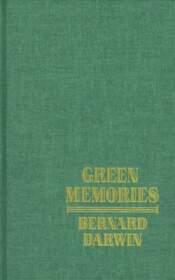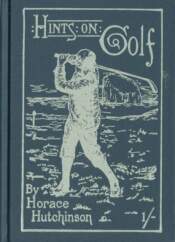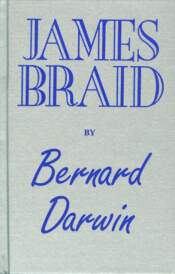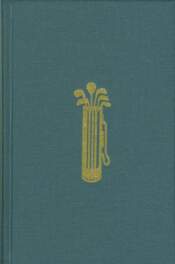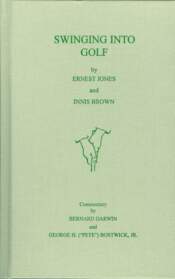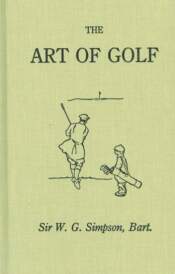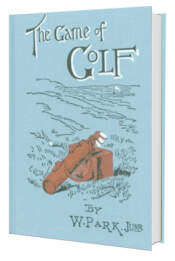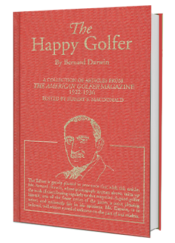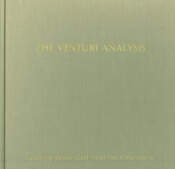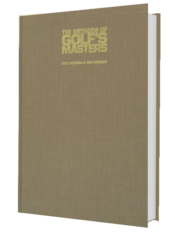$35.00Add to cart
By Bernard Darwin
A HISTORY OF GOLF IN BRITAIN was an effort on the part of the best English writers to put out a definitive history of the game of golf in Great Britain. The best English writer, in fact the best golf writer ever, Bernard Darwin, acted as general editor of the project as well as contributing two long essays: THEN AND NOW and FROM GUTTY TO RUBBER-CORE.
Henry Cotton is a highly intelligent analyst and instructor and wrote his own material as so few successful professionals have done. Henry Longhurst writes entertainingly and with a perspective all his own, and his chapter BETWEEN TWO WARS deals mainly with the Americans, Hagen, Jones, and Sarazen, for it was they who dominated this period of British golf. Leonard Crawley is an excellent writer; the focus in A FRESH START is mainly British; for American tastes there is some wonderful writing on the Walker Cup and Ryder Cup matches. WOMEN'S GOLF, by Enid Wilson, is a gem, dealing with the American stars as comprehensively as with the British and writing with real perception and understanding - a brilliant chapter. THE FUTURE OF THE GAME is in many ways an odd chapter, but it is the 'piece de resistence' in the book. Coming at golf from a scientific point of view, Lord Brabazon asks what it is we like about the game and how are we going to preserve what we like? The game is changing, he believes, and is in danger of leaving behind some of its most enjoyable aspects. He suggests certain innovations that stagger one by their originality and obviousness.
Lord Brabazon of Tara When after the Second World War, Churchill wished to reward Moore-Brabazon for his extraordinary help as Minister of Aircraft Production, he recommended him for a barony. Moore-Brabazon accepted with pleasure. "To be made a Peer," he wrote, "is a great privilege because we are still a very snobbish people." That is the way Moore-Brabazon looked at things: with legendary self-honesty. He wanted Brabazon to be part of his title because the name had been enscrolled on the Battle of Hastings in 1066, but he needed an "of" because someone else already had Brabazon, so he selected "of Tara". He liked the ring of the words.
As a young man, Lord Brabazon became in 1909 the first English aviator, i.e. the first Englishman to fly a plane in England. He was one of the major pioneers in the development of the airplane in the British Isles and, indeed, in the world. He virtually invented the art of aerial photography during World War I. He was not a politician - the deviousness necessary to survive in office was totally lacking in him - but Churchill needed him during World War II, first as minister of transport and then, following the terrifying Lord Beaverbrook, as minister of aircraft production. Beaverbrook was inspirational and singlehandedly ran every aspect of the ministry, but there was a lack of planning, which was Lord Brabazon's strong suit. He understood in his supremely practical way that no matter how many planes you were turning out, it did you no good if certain small parts were missing. You had planes but they couldn't fly. If, on the other hand, you could find out three or four months before delivery what parts were likely to be in short supply, you would then have time to correct the shortage. A great many planes began coming off the assembly lines ready to fly, and this is one of the reasons England won the Battle of Britain and turned the tide of the war.
Eventually Lord Brabazon's lack of political skills did him in. Misquoted about England's relationship with Russia, he became a target of the trade unions, and Churchill finally had to ask him to resign in order to calm the political waters. He did so with relief and without regret.
He learned golf when he was twenty-six and worked so diligently at the game that he got down to a scratch handicap, but he was not a really find golfer, and he knew it. He enjoyed Roger Wethered's description of him as "the best bad golfer in England". He was proudest of being elected Captain of the R. & A. in 1952-53. The Captain is inaugurated by his driving off the first tee of St. Andrews in front of a huge crowd and a group of caddies who wait for the traditional golden sovereign given to whichever of them retrieves the ball. The caddies gathered downfield about two hundred yards, but Lord Brabazon dribbled one off the tee, and the caddies had to race in well over half way. It was an embarrassing moment. At the great banquet that night, Lord Brabazon announced that he had hit the grounder on purpose as an encouragement to all bad golfers, and then he added, after a few moments of dreadful silence, "If you believe that, you'll believe anything."
Lord Brabazon had a most simple and direct ethic: whatever you enjoy, you have an obligation to make better, if you can. He served tirelessly on many committees that were established by the R. & A., the governing body of golf. It was perhaps through his committee work that he got to know Bernard Darwin. He played golf with Darwin, which was somewhat like working for Churchill - an often terrifying experience. "I once played for the Oxford and Cambridge Golfing Society and Bernard was our Captain. He did me the great honour of letting me play first, and I played with him in the foursomes. It was a lovely day; we had the pleasantest of opponents; the birds were singing; the course was beautiful; and the whole thing was pure and utter joy. We were not doing so well and, about six holes from the end, I put Bernard in the rough. He beckoned me to follow him, and I got the most appalling dressing down I have ever had. He told me kindly to remember that we were playing for the Oxford and Cambridge Society, and that this was not a `jolly' but a very serious match, and would I please concentrate on it and not make silly remarks or fool around. . . that was Bernard all over. He never played a match in his life that wasn't as much to him as if he were playing in the Walker Cup."
In reflecting on his life, Lord Brabazon had this to say, "When I look back and try to decide out of what I got the most actual pleasure, I have no doubt that I got more out of golf than anything else." His essay, THE FUTURE OF THE GAME, is one of the most important ever written about the game of golf. We need him today. Many of us suspect that golf is changing and not changing for the better, but we cannot think about it as clearly as Lord Brabazon did or as Bernard Darwin did, for they were ones of a kind. How nice it is to have them together in one volume.
Foreword by Herbert Warren Wind and Sir George Cunningham

